Covid death rate is now 16 TIMES lower than it was during the first and second waves, data shows amid fears daily infections will breach 200,000 in the next few weeks
- Infections are currently running at about 45,000 a day while there are 40 Covid fatalities every 24 hours
- But when infections were at this level during the second wave the country was recording 640 deaths a day
- Experts have warned that today’s unlocking could drive daily cases up to 200,000 despite the vaccines
Britain’s Covid death rate is now 16 times lower than it was during both the first and second waves because of vaccines, analysis shows.
Infections are currently running at about 45,000 a day across Britain, with 40 deaths being registered every 24 hours on average.
But the last time cases hit this level — when the second wave began to spiral out of control in late December — there were as many as 640 daily fatalities.
One of the Oxford University researchers who helped design AstraZeneca‘s jab today credited the vaccines for keeping the death rate so low. Sir Andrew Pollard warned deaths would inevitably rise over the coming weeks in line with cases but insisted that they won’t reach levels seen during the darkest days of January’s peak.
Experts have warned today’s Freedom Day will only cause infections to spiral further, although the hot weather and school holidays should help stem the spread of the virus.
‘Professor Lockdown’ Neil Ferguson, a key member of SAGE, yesterday warned that infections may hit 200,000 a day in the coming weeks.
He admitted he would consider the final loosening of restrictions a success if cases stayed below half this level, and daily hospitalisations peak at around 1,000. But the Imperial College London epidemiologist said No10’s top experts were clueless as to just how bad the crisis could become.
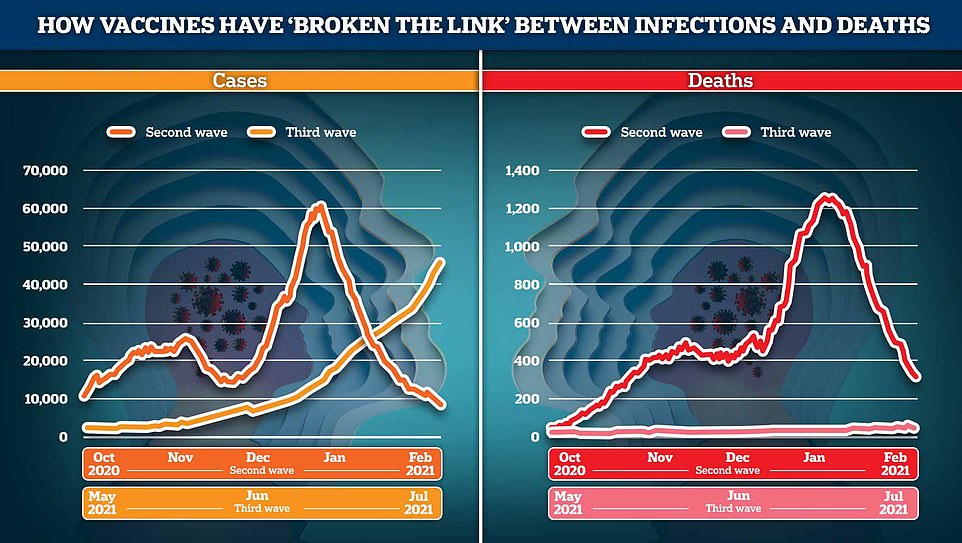
Infections are currently running at about 45,000 a day (yellow line shows cases increasing since May) but deaths are still flat at about 40 a day (pink line shows fatalities in the third wave). For comparison, the last time cases hit this level when the second wave began to spiral out of control (orange line) there were more than 600 daily deaths
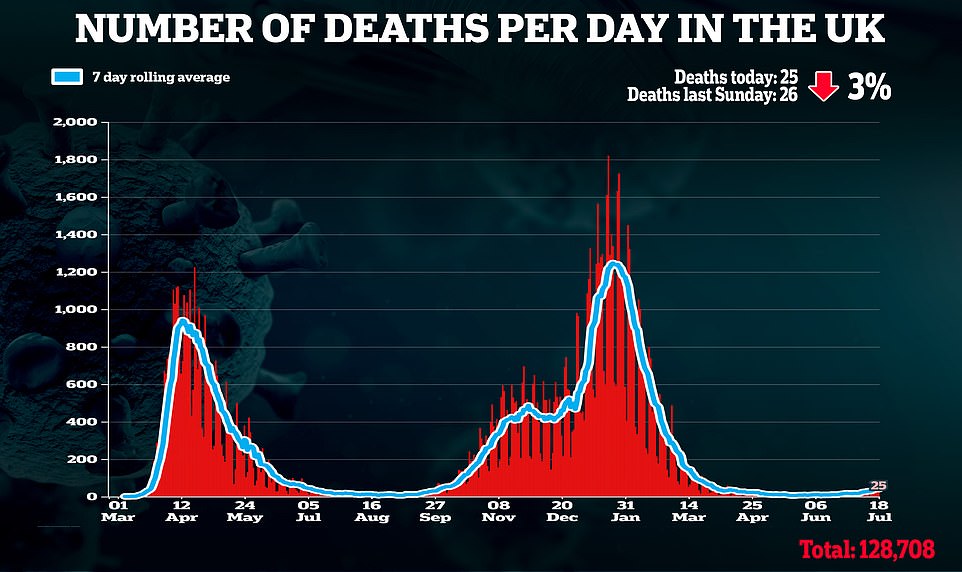
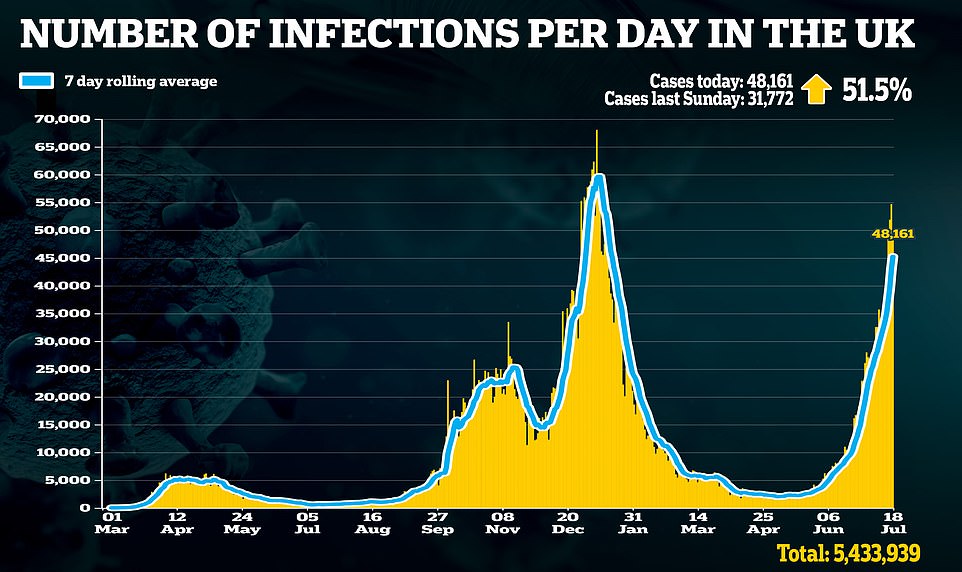
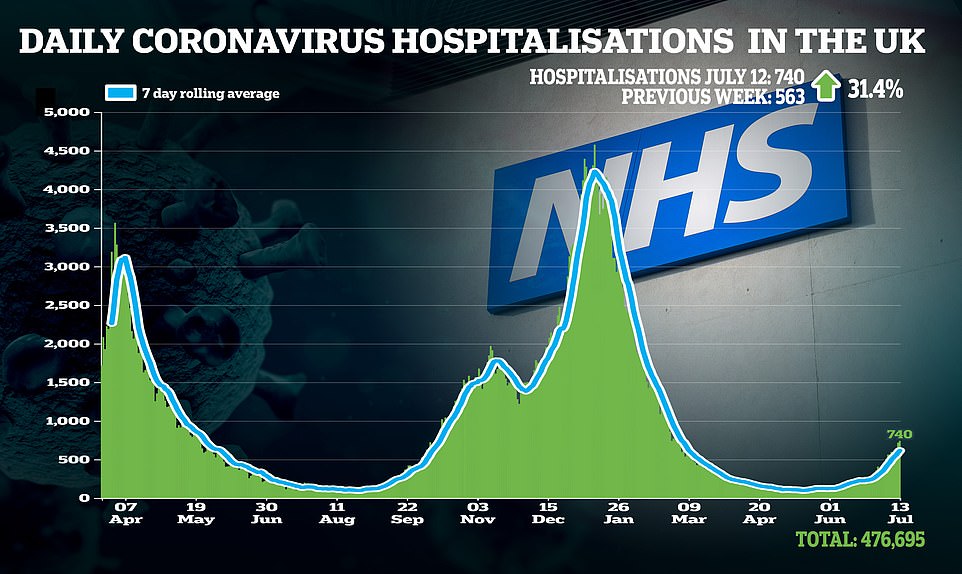

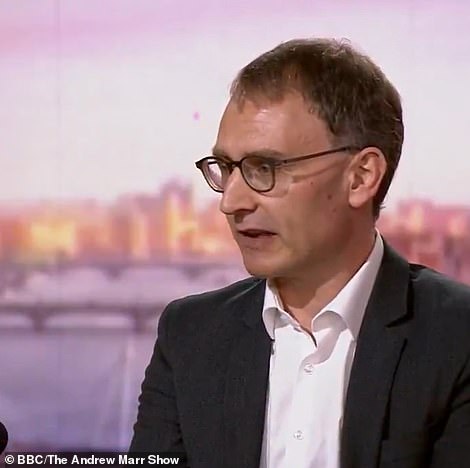
Professor Sir Andrew Pollard (left) said it was thanks to the vaccines that deaths had plunged to far lower levels. But ‘Professor Lockdown’ and top SAGE adviser Neil Ferguson (right) warned they were likely to tick upwards in the coming weeks. He said easing restrictions would be a success if cases remained below 100,000
Department of Health data shows hospitalisations are currently more than four times below the level they hit when Covid was rife during December.
There are 614 admissions a day on average across Britain, compared to 2,800 on December 28 when cases also stood at almost 50,000.
Deaths and hospitalisations lag several weeks behind cases, which are the first warning sign that the UK could run into trouble.
But evidence shows the current surge is not leading the NHS to face as serious pressure as it did during the first and second waves because of vaccines.
Many of the hospital admissions are in younger or vaccinated people which means their illness is often more mild – and their hospital stay shorter – than in previous waves.
SAGE does not expect hospital capacity to reach the 36,000 peak seen in January, and probably no more than half that, even in a worst-case scenario.
However, Professor Ferguson admitted that even large levels of daily admissions could cause ‘major disruption’ to the NHS, forcing hospital bosses to cancel thousands of vital operations.
Office for National Statistics data shows deaths are running five per cent below the five-year average, with Covid behind around just one per cent of all fatalities.
For comparison, at the height of the second wave the virus was linked to more than 40 per cent of all deaths.
Sir Andrew, the director of the Oxford vaccine group, said death rates from Covid will remain low because of the jabs.
He told BBC Radio 4’s Today programme: ‘The effectiveness of vaccines against severe disease and hospitalisation and death remains extremely high against the variants which are around here in the UK.
‘I think with that information, we can be very confident that the rates will remain low — but they are going to rise, and we know that.
‘The modelling predicts that there will be an increase in cases as we have been hearing over the last few days.
‘Of course we’re seeing it, that there are more people getting infected, and that will unfortunately translate into an increase in hospitalisations and deaths.
‘But it will be far lower than we have experienced in previous waves.’
More than 45.2million Britons — or 87.9 per cent of adults — have got one dose, while 35.9million — or 68.3 per cent — have received both jabs.
Britain’s roll-out has relied on the Pfizer and AstraZeneca vaccines, both of which are highly effective at preventing severe disease and death.
The Prime Minister ordered the lifting of the remaining restrictions in England today, after warnings from ministers this could lead to cases spiralling to 100,000 a day.
But experts say the ‘real question now’ is whether they will surge to double this number and hit 200,000 a day.
It is thought the bout of warm weather — allowing people to socialise outdoors — and the school holidays will help keep surging infections at bay.
Cases have already started to fall in the country’s hotspot of South Tyneside, raising hopes that the end may be in sight for the worst-hit areas.
Professor Ferguson told Andrew Marr yesterday: ‘Success would be keeping hospitalisations at around 1,000 and case numbers, maybe peaking a little over 100,000 a day and then slowly declining.’
But he said: ‘It is likely to be a slow decline because we will be seeing contract rates increase with this relaxation, and yet we’re still vaccinating people, people are getting immunity through being infected as well.
‘We have the relaxation on Monday, but significantly we also have school holidays.
‘We’ve seen a lot of transmission among teenagers, and those contact rates will probably tick down.’
It comes as Mr Johnson and the Chancellor Rishi Sunak spend the first day of freedom in self-isolation after being exposed to a top minister who had the virus.
The pair were forced into a humiliating U-turn yesterday, after announcing they would not be taking advantage of a Government scheme that would allow them to replace self-isolation with daily lateral flow tests.
